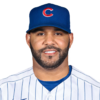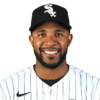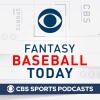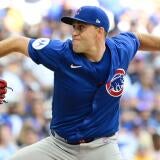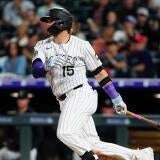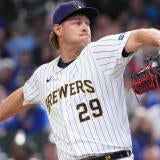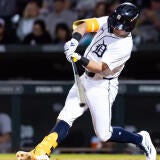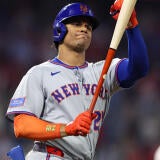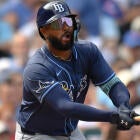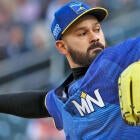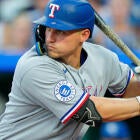Previewing 2020 Fantasy Baseball Rankings: Top 20 shortstops feature an increasing number of stars, including Marcus Semien and Bo Bichette
Shortstop just seems to get better and better, and it's now a position where you're likely to double up, as Scott White's early rankings show.
I've been harkening back to a time when shortstop offered just four or five true standouts for so long now that I'm not sure anyone remembers it anymore. The position has since become a repository of talent, and it just gets deeper and deeper.
Prospects like Fernando Tatis and Bo Bichette arrive and live up to their potential right away. Stragglers like Marcus Semien and Jorge Polanco finally deliver on all their promise. Even relative disappointments like Paul DeJong and Dansby Swanson, who faded too hard down the stretch to secure a spot in my top 20, had periods when they looked like they were joining the position's elite. Third base may be the only position that can compete in terms of top-shelf talent.
So while it would have been heresy back in my salad days, it seems perfectly reasonable now to draft a shortstop for your utility spot. Note, however, that Ketel Marte and Eduardo Escobar won't be among your choices at the position. They didn't make enough appearances there to retain eligibility into 2020.
| 1 |
Francisco Lindor
Cleveland Indians SS
|
| Now proven twice over as a base-stealer, Francisco Lindor has the most diverse skill set at the position, his low strikeout rate further setting him apart and ensuring his talents aren't better served in one format than another. His impact was diminished slightly in 2019 by a weak Indians lineup and an early-season calf injury, but not enough to remove him from first-round consideration. | |
| 2 |
Alex Bregman
Houston Astros 3B
|
| While Lindor is the best all-around player at the position, Alex Bregman is the best pure hitter, and the ever-widening gap between his walks and his strikeouts probably ensures he'll go ahead of Lindor in points leagues. Having dual eligibility helps, though chances are you won't be hurting for another third baseman. | |
| 3 |
Trevor Story
Colorado Rockies SS
|
| The strikeout and stolen base gains from 2018 more or less carried over to 2019, which means Trevor Story is now a tried-and-true early-rounder, most likely going late in the first or early in the second. His 5x5 projection is similar to Lindor's but with more strikeouts, which might be a problem if he wasn't playing half his games at Coors Field. | |
| 4 |
Trea Turner
Washington Nationals SS
|
| Trea Turner will again be the chic pick among those who prefer not to leave stolen bases to chance, and it's true he's one of the few reliable sources of them who also happens to be pretty good at everything else. But stolen bases are among the least reliable contributions given that they're influenced by so many factors beyond pure ability, which makes an investment in it riskier than in a big bat. Plus, Turner has had trouble staying on the field. | |
| 5 |
Xander Bogaerts
Boston Red Sox SS
|
| You know how I said Bregman is the best pure hitter at the position? Xander Bogaerts has a case as the second-best, but at least in traditional 5x5 leagues, it's hard for him to compete with the shortstops who make some sort of contribution in stolen bases. Go ahead and slot him ahead of Turner in points leagues -- that is, unless the Red Sox go the semi-rebuild route this offseason. | |
| 6 |
Fernando Tatis
San Diego Padres SS
|
| Given what Fernando Tatis accomplished as a 20-year-old rookie, there's no denying he could break through as a top-five overall player in 2020. But going purely by the skill indicators, he overachieved in 2019. The BABIP and home run-to-fly ball rate were both outlandish, and so we could see a similar drop to the one Javier Baez experienced this year. Tatis' steals pace also slowed dramatically over the course of the season, and he suffered two fairly significant injuries that could be blamed on his style of play. | |
| 7 |
Gleyber Torres
New York Yankees SS
|
| Gleyber Torres is No. 3 in my second base rankings, which not only demonstrates the difference in depth between the two positions but also serves to elevate him here. The power output may have been a little much in 2019, but he cut down on his strikeouts in a meaningful way and will of course have the benefit of a loaded lineup again. | |
| 8 |
Carlos Correa
Houston Astros SS
|
| While Carlos Correa bounced back statistically from an injury-plagued 2018, the fact is he missed even more time with injuries this go-around. Whenever a player develops a history of back issues, it's cause for alarm, and the fact Correa is there at age 25 is especially nauseating for his dynasty owners. Still, he should be studly as long as he's on the field. | |
| 9 |
Bo Bichette
Toronto Blue Jays SS
|
| Bo Bichette wasn't the Blue Jays rookie everyone thought would ascend to immediate stardom, but the prospect pedigree supports it. He's a hitter through and through, demonstrating excellent control of an otherwise wild-looking swing, and his power seems to play up against big-league strike-throwers. There's potential beyond what he's already shown, too, considering his prolific base-stealing in the minors. | |
| 10 |
Marcus Semien
Oakland Athletics SS
|
| In what's sure to be a controversial take given his lackluster track record, I'm willing to give Semien much of the benefit of the doubt. Full benefit of the doubt would position him three or four spots higher, so I'm not a total monster, but his plate discipline improved in a way that's not only striking but also befitting the profile he showed coming up through the White Sox system. The contact he made was harder and more efficient -- particularly in the second half, when he cut way down on the ground balls. | |
| 11 |
Javier Baez
Chicago Cubs SS
|
| The numbers look pretty strong still for last year's NL MVP runner-up, but subtle slippage across the board made Baez far less of a standout in a surging offensive environment. Of particular concern was the decline in stolen bases, and if he's not a significant source of them, he's just another slugger in a landscape littered with them -- not to mention one with subpar on-base skills. The loss of multi-eligibility also limits his appeal. | |
| 12 |
Manny Machado
San Diego Padres 3B
|
| Checking in at 13 in my third base rankings, Machado's stock has clearly fallen, and more and more, the splits suggest that a venue change is to blame. He was at his worst in the pitcher-friendly environment of San Diego while always performing at his best in the hitter-friendly environment of Baltimore. But the overall numbers weren't bad, just less than studly, and seeing as he's only 27, there's hope for a rebound. | |
| 13 |
Jonathan Villar
Baltimore Orioles 2B
|
| There will be great temptation to reach for Jonathan Villar in traditional 5x5 leagues after a 20-homer, near 40-steal season (the second number being the most important one), and it's worth pointing out he's 10th in my second base rankings. But the caliber of hitter you'd be passing up in the name of category scarcity makes me feel icky inside. Villar had a combined .689 OPS the previous two years, after all. | |
| 14 |
Adalberto Mondesi
Kansas City Royals SS
|
| If you think the Villar ranking is controversial, just wait until the stolen base zealots see what I've done to Adalberto Mondesi, who has become the game's preeminent base-stealer ... when he's on the field. But of greater concern than his twice-dislocated left shoulder and eventual surgery to correct it was the collapse of every skill other than the stolen bases as the season played out. His strikeout rate skyrocketed after the first two months, and he put the ball on the ground too often to provide anything in the way of power. | |
| 15 |
Jorge Polanco
Minnesota Twins SS
|
| After an electrifying start, Jorge Polanco revealed over the course of the season that he doesn't quite have the power to hang with the big bats at the position, but what power he did gain by upping his fly-ball rate was enough to bolster an already impressive batted-ball profile. He makes contact, hits line drives, uses all parts of the field and is certainly among the must-start options at the position even if he's second-tier. | |
| 16 |
Tim Anderson
Chicago White Sox SS
|
| A near-.400 BABIP isn't one you should expect Tim Anderson (or any other hitter) to sustain, but even if multiple batting titles aren't in his future, his improvement against breaking balls -- a product of a new timing mechanism -- has clearly raised his batting average ceiling to the point that his ghastly walk rate is no longer such an impediment. The steals dried up down the stretch, which is an ongoing frustration with him, but at least he has some other skills to fall back on. | |
| 17 |
Corey Seager
Los Angeles Dodgers SS
|
| You'd be right to move Corey Seager ahead of Anderson in a points leagues, where the latter's contribution in steals isn't of great significance. Seager, who was formerly thought to be first-round material in Fantasy, didn't have the most validating return from Tommy John surgery, but the plate discipline was good and he came on strong late with a batted-ball profile more befitting his pre-surgery form. At 25, he may still meet his high-end potential. | |
| 18 |
Didi Gregorius
New York Yankees SS
|
| Another Tommy John returnee -- this one a couple months into the season -- Didi Gregorius showed all the home run power we've grown accustomed to seeing from him with the Yankees, but this time the road splits came out more favorably, which should ease concerns he's simply a product of his ballpark as he enters free agency. He makes a ton of contact but has a low-BABIP profile that limits his batting average. Still, his 2019 numbers are closer to his floor than ceiling. | |
| 19 |
Amed Rosario
New York Mets SS
|
| His former top prospect standing has for too long now inflated Amed Rosario's Fantasy stature beyond a level he should be expected to meet, but seeing as he'll only be 24 next year, it's reasonable to assume his best is yet to come. He may even have in him a Rafael Devers-level explosion that isn't fully telegraphed ahead of time. He did make his clearest progress yet in 2019, most notably by cutting down on the strikeouts in the second half, and the steals alone give him some modest 5x5 appeal. | |
| 20 |
Elvis Andrus
Texas Rangers SS
|
| Elvis Andrus' big April put him back on the map after a fractured elbow took him off it last year, but nearly half his home runs came in that one month. He was running like crazy, which helped mask his hitting demise, but by the end of 2019, he had stopped doing that, too. He has more mileage on him than most 31-year-olds, and shortstops aren't known for aging gracefully. Still, the prospect for 30 steals earns him benefit of the doubt. | |













